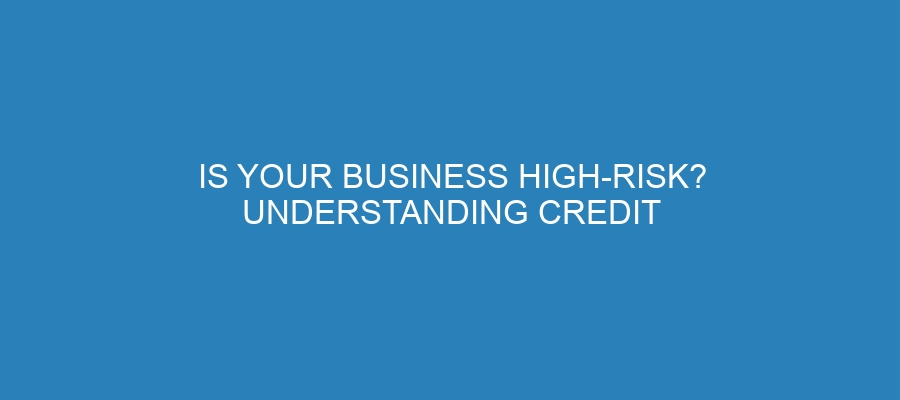In today’s rapidly evolving marketplace, businesses of all sizes are pursuing credit card processing options to maximize sales, enhance customer convenience, and streamline operations. However, not all businesses are created equal when it comes to credit card processing. If you’ve ever wondered, “Is my business high-risk?”—you’re not alone! Understanding the complexities behind credit card processing can be daunting, especially for businesses that might fall into the high-risk category. In this article, we’ll uncover what makes a business high-risk, the challenges associated with credit card processing, and how to navigate these waters to secure the best options for your business.
What Makes a Business High-Risk?
1. Business Type:
Some industries are automatically classified as high-risk due to their nature. For instance, businesses in sectors like adult entertainment, online gambling, travel bookings, and dietary supplements often face stringent regulations and a higher likelihood of chargebacks. If your business operates in a sector that is commonly viewed as risky, your odds of being categorized as high-risk increase significantly.
2. Chargeback History:
A high chargeback ratio can trigger your classification as a high-risk business. Chargebacks occur when customers dispute a transaction, leading to refunds emanating from your payment processor. If you experience recurring disputes, this red flag will certainly affect your credit card processing options.
3. Startups and New Businesses:
Established businesses often enjoy better terms due to their track records. New companies, especially startups, might face difficulties securing credit card processing due to perceived instability or lack of financial history.
4. Financial Instability:
Business finances play a crucial role in determining risk levels. Financial metrics, such as inconsistent revenue streams or rapid growth without stabilization, can signal vulnerability to payment processors, classifying your business as high-risk.
5. Location and Compliance:
Businesses not abiding by local regulations or operating in regions with strict laws may find themselves facing obstacles in securing reliable payment processing options. Compliance issues can lead to higher information scrutiny, affecting your acceptance as a mainstream merchant.
The Credit Card Processing Challenges
If your business is identified as high-risk, you will undoubtedly face several challenges:
High Processing Fees: High-risk businesses often encounter higher processing fees than their low-risk counterparts. Payment processors take into account the potential for chargebacks and the increased risk, which invariably raises costs.
Limited Options: Many mainstream payment processors shy away from high-risk businesses, limiting options for handling credit card transactions effectively. This can lead you to seek specialized providers, often with varying levels of service quality.
Longer Setup Times: The onboarding process for high-risk businesses can be convoluted and time-consuming. Expect thorough vetting processes to ensure your business meets the strict criteria set by processors.
Higher Scrutiny: Expect your transactions to be closely monitored. If your business exhibits any irregular patterns, it could lead to freezing or termination of your merchant account.
Difficulties in Reputation Management: High-risk businesses can sometimes struggle to establish credibility. An undesirable reputation can deter customers and decrease sales.
What Can You Do?
If you recognize your business as high-risk, don’t lose hope! There are practical steps you can take to secure reliable credit card processing.
1. Research Specialized Processors:
Look for processors that emphasize serving high-risk entities. Providers like Payment Cloud focus on creating tailored solutions that cater to varying business needs.
2. Improve Financial Management:
Streamline your financial practices, resolve outstanding chargebacks, and ensure proper documentation for your sales. A stable financial footing can help lower your risk profile over time.
3. Develop Transparency:
Being open about your business practices with potential processors can build trust. Presenting a solid business plan and clearly communicating how you mitigate risks will enhance your reputation.
4. Increase Customer Support:
Implement robust customer service solutions to address payment-related inquiries or concerns quickly. This approach can reduce the likelihood of chargebacks and maintain smoother transactions.
5. Get External Help:
If you’re overwhelmed by the prospect of navigating the complexities of credit card processing, consider reaching out to specialized consultancies that focus on high-risk businesses.
FAQs
Q: How can I determine if my business is high-risk?
A: Look into industry standards, chargeback rates, and regulatory compliance aspects.
Q: What types of businesses are usually considered high-risk?
A: Industries like travel, gaming, adult services, and SaaS typically fall into this category.
Q: What happens if I exceed my chargeback limit?
A: Exceeding limits could lead to account suspension or higher processing fees.
Q: Can I still accept credit cards if I’m deemed high-risk?
A: Yes! There are specialized processors that cater to high-risk businesses—though it may come with higher fees.
Q: Are there alternatives to credit card processing?
A: Yes, consider options like e-wallets, direct bank transfers, or alternative financing solutions.
Conclusion
Recognizing the high-risk nature of your business is the first step towards finding effective credit card processing solutions. With diligence, transparency, and by partnering with the right providers, you can successfully navigate the complexities of this landscape.
If you are facing challenges and seeking reliable merchant processing options, look no further than Payminate.com. Their specialized expertise in high-risk payment solutions can improve your chances of securing the support you need and help you focus on what truly matters—growing your business. Don’t let your high-risk status hold you back; take the proactive step today!

